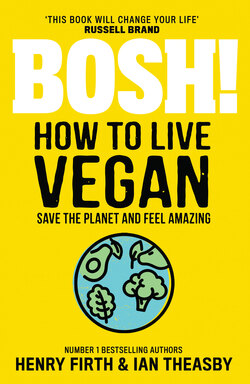Читать книгу BOSH! How to Live Vegan - Henry Firth - Страница 30
However, ultimately, wherever your meat, fish or dairy is coming from, it is a less environmentally friendly choice than any plant-based food. A plant-based meal is more sustainable than one containing animal products. And so, the more plants you eat, the better. SOY IS IT BAD FOR ME, AND IS IT BAD FOR THE PLANET?
ОглавлениеDepending on who you are, you might see soy as either a wonderful health food or a risky ingredient to be avoided. And as far as the planet is concerned, there are differing opinions about how soy for humans is affecting the health of the planet. Some see it as the cure-all for our planet’s woes, and some see it as the cause of rainforest deforestation. Let’s delve into them both.
Soy is, on balance, a health food.
Some people, as part of some research from the 90s, formed the opinion that soy could be bad for your hormonal health. They drew inferences from the fact that soy contains oestrogen-like compounds and speculated that it could mess with the hormonal balance of both women and men in different ways. These studies have largely been disproven now, and recent research shows that moderate consumption of soy foods can actually have some benefits.[62] Even a correlational relationship is not maintained, so largely we know this is not the case.
On the other hand, soy is a very powerful and healthy plant-based protein. It’s a complete protein, containing all the nine essential amino acids we need in our diets (see here for more on these). And it’s a good source of omega-3 fats, iron, zinc and calcium.
Soy fields are a cause of rainforest deforestation, but this soy is grown for animal feed.
Significant amounts of the Amazonian rainforest are being destroyed every day, and these trees are crucial to our planet’s survival. They are the lungs of our planet, and their loss is a significant factor in contributing to climate change.
A large amount of the rainforest deforestation occurs to make way for large, monocrop soy fields. This has been used regularly to illustrate that vegans’ choice of soy milk is poor. But that’s not the full story!
Eighty per cent of the soy that is grown in the Amazon (the soy for which the rainforests are being destroyed) is fed to animals, [63] and indeed up to 90% of the rainforest’s total deforestation is for animal agriculture.[64] But as we’ve seen, only 6% of the soy produced globally is consumed by humans.[65] So, while it is true that the megafields of soy are causing mass destruction of the rainforest, it’s the animal agriculture industry that is causing it and utilising the soy.
Also, when comparing the environmental impact that soy has on the planet versus an animal-based protein like beef, you should take into consideration all the soy the animal has consumed as part of its lifecycle. When framed like this it seems silly to compare the two. Rearing an animal is a much less efficient way to get protein, with only a fraction of the energy that is fed to the animal as plants being available to humans as meat. (See here).
So, despite what many people would have you believe, you should feel free to consume soy with a clear conscience, from both a health and environmental perspective. It’s good for your body and is much more environmentally friendly, when you look at all the factors involved, than eating a comparable animal protein. Miso, soy sauce, soy milk, edamame, tofu and tempeh are all wonderful choices for you to include in your diet. We highly recommend getting on board with soy. It doesn’t deserve its bad reputation, and in fact is part of the solution to the planet’s ills, not part of the problem.
